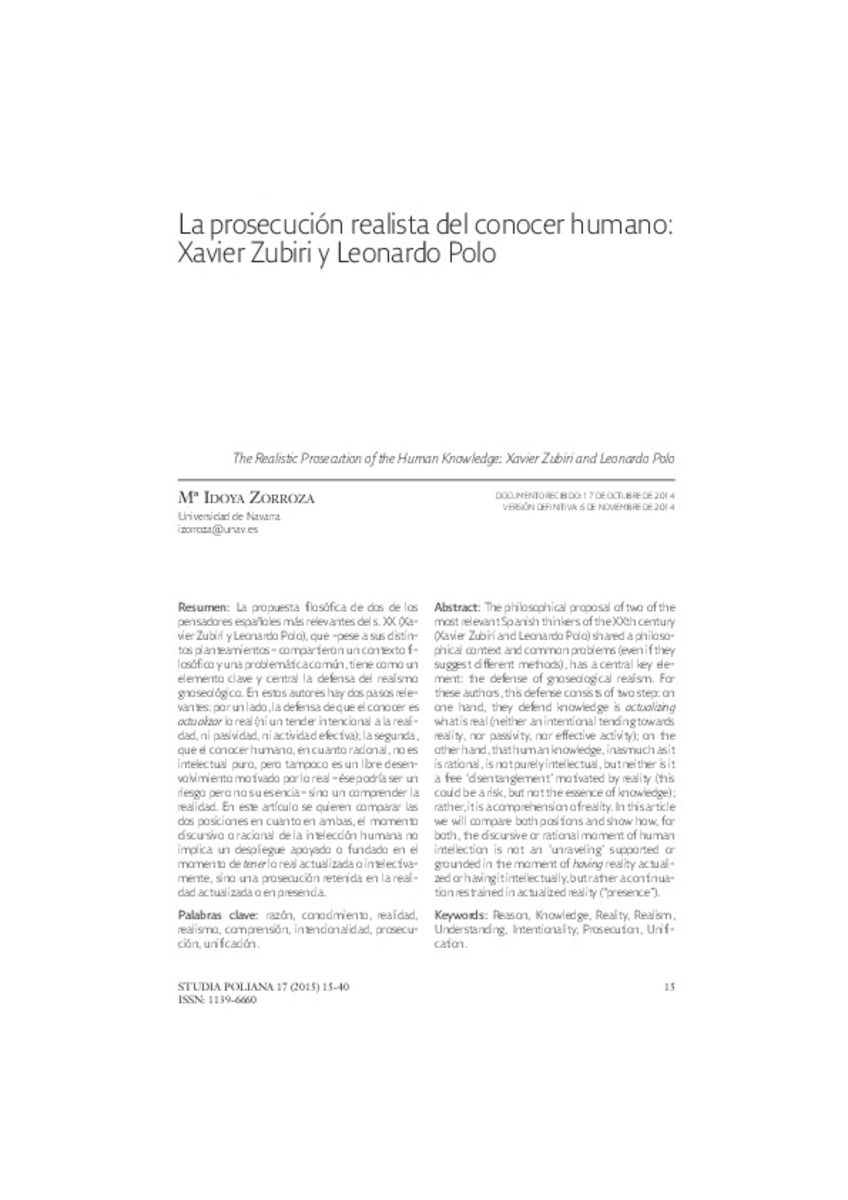Full metadata record
| DC Field | Value | Language |
|---|---|---|
| dc.creator | Zorroza-Huarte, M.I. (María Idoya) | - |
| dc.date.accessioned | 2017-02-06T11:08:21Z | - |
| dc.date.available | 2017-02-06T11:08:21Z | - |
| dc.date.issued | 2015 | - |
| dc.identifier.citation | Zorroza, María Idoya; ""La prosecución realista del conocer humano: Xavier Zubiri y Leonardo Polo"". En Studia Poliana. 17, 2015, 15-40 | es_ES |
| dc.identifier.issn | 1139-6660 | - |
| dc.identifier.uri | https://hdl.handle.net/10171/42953 | - |
| dc.description.abstract | La propuesta filosófica de dos de los pensadores españoles más relevantes del s. XX (Xavier Zubiri y Leonardo Polo), que –pese a sus distintos planteamientos– compartieron un contexto filosófico y una problemática común, tiene como un elemento clave y central la defensa del realismo gnoseológico. En estos autores hay dos pasos relevantes: por un lado, la defensa de que el conocer es actualizar lo real (ni un tender intencional a la realidad, ni pasividad, ni actividad efectiva); la segunda, que el conocer humano, en cuanto racional, no es intelectual puro, pero tampoco es un libre desenvolvimiento motivado por lo real –ése podría ser un riesgo pero no su esencia– sino un comprender la realidad. En este artículo se quieren comparar las dos posiciones en cuanto en ambas, el momento discursivo o racional de la intelección humana no implica un despliegue apoyado o fundado en el momento de tener lo real actualizada o intelectivamente, sino una prosecución retenida en la realidad actualizada o en presencia. | es_ES |
| dc.description.abstract | The philosophical proposal of two of the most relevant Spanish thinkers of the XXth century (Xavier Zubiri and Leonardo Polo) shared a philosophical context and common problems (even if they suggest different methods), has a central key element: the defense of gnoseological realism. For these authors, this defense consists of two step: on one hand, they defend knowledge is actualizing what is real (neither an intentional tending towards reality, nor passivity, nor effective activity); on the other hand, that human knowledge, inasmuch as it is rational, is not purely intellectual, but neither is it a free ‘disentanglement’ motivated by reality (this could be a risk, but not the essence of knowledge); rather, it is a comprehension of reality. In this article we will compare both positions and show how, for both, the discursive or rational moment of human intellection is not an ‘unraveling’ supported or grounded in the moment of having reality actualized or having it intellectually, but rather a continuation restrained in actualized reality (“presence”). | es_ES |
| dc.language.iso | spa | es_ES |
| dc.publisher | Servicio de Publicaciones de la Universidad de Navarra | es_ES |
| dc.rights | info:eu-repo/semantics/openAccess | es_ES |
| dc.subject | razón | es_ES |
| dc.subject | conocimiento | es_ES |
| dc.subject | realidad | es_ES |
| dc.subject | realismo | es_ES |
| dc.subject | comprensión | es_ES |
| dc.subject | intencionalidad | es_ES |
| dc.subject | prosecución | es_ES |
| dc.subject | unificación | es_ES |
| dc.subject | Reason | es_ES |
| dc.subject | Knowledge | es_ES |
| dc.subject | Reality | es_ES |
| dc.subject | Realism | es_ES |
| dc.subject | Understanding | es_ES |
| dc.subject | Intentionality | es_ES |
| dc.subject | Prosecution | es_ES |
| dc.subject | Unification | es_ES |
| dc.title | La prosecución realista del conocer humano: Xavier Zubiri y Leonardo Polo | es_ES |
| dc.title.alternative | The Realistic Prosecution of the Human Knowledge: Xavier Zubiri and Leonardo Polo | es_ES |
| dc.type | info:eu-repo/semantics/article | es_ES |
| dc.identifier.doi | 10.15581/013.1421 | es_ES |
Files in This Item:
Statistics and impact
Items in Dadun are protected by copyright, with all rights reserved, unless otherwise indicated.






